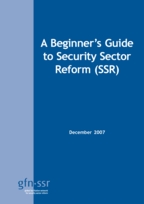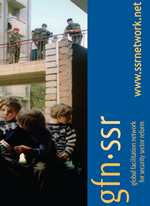Sub-Regional Case Studies
Somalia
Somalia has undergone continuous political turmoil since the collapse of Mohammed Siad Barre’s authoritarian socialist government in 1991, which triggered the violent disintegration of the state. A power struggle has ensued between various warlords, killing and wounding thousands of civilians in the process. UN peacekeeping forces, led by US marines, landed in Mogadishu in 1992 to protect an ongoing humanitarian effort, but withdrew two years later having failed in its mission. In 2004, a 14th attempt was made to restore a central government in Somalia, with the formation of an elected Transitional Federal Government (TFG) that aimed at restoring governance and holding national elections in 2009. In June 2006, however, a coalition of clerics, business leaders and Islamic Court militias known as the Council of Islamic Courts (CIC) defeated powerful Mogadishu warlords and took control of the capital and, later, other parts of southern Somalia. Concerned over alleged links between some CIC factions and the Al-Qaida East Africa network, Ethiopia together with Transitional Federal Government forces intervened in December 2006, which led to the collapse of the CIC. Continuous fighting has occurred since then between the TFG and extremist movements associated with the defunct CIC.
Nevertheless, in other parts of the country, two more stable quasi-states have emerged amidst the virtual anarchy that reigns in Mogadishu: Somaliland and Puntland. Somaliland has taken its first steps towards statehood by holding elections and providing services to its people, while Puntland is attempting a statebuilding project of its own, albeit with fewer resources and weaker capacity than Somaliland. However, these nascent democratic projects are threatened by lack of international recognition and border disputes between states. The power vacuum and climate of lawlessness in other parts of Somalia has proved ripe ground for the advent of international and national criminal networks and extremist groups. Alongside the threats of terrorist groups such as al-Ittihad and al-Shahab, maritime piracy against international vessels has emerged as a growing problem. Chaos within the state and weaknesses of the ruling government (including the virtual lack of a security sector) means that the context in Somalia is not appropriate for any sustainable SSR efforts.
With regards to SSR, DDR initiatives have also been implemented with varying degrees of success in different parts of Somalia. In Somaliland, the successful DDR process was a clan-sanctioned and widely agreed initiative. Somaliland managed to implement low-cost effective clan disarmament, and also succeeded in applying mechanisms of local/traditional conflict resolution, establishing peace, multi-party democracy and the existence of a vibrant civil society. In contrast, unsuccessful DDR in southern Somalia is often cited as one major reason for the continued violence and instability.
- SSR: General
- Civil Society
- Governance
- Justice Reform
- Non-state Actors
- Private Security Companies
- Terrorism
- Related Texts
SSR: General
Menkaus, K., 2004, Vicious circles and the security development nexus in Somalia, Conflict, Security & Development, Vol. 4, No. 2, pp.149-165
Conflicts that appear to be self-reinforcing in the short-term can in the long-term produce conditions out of which new political orders emerge. This paper, published by Conflict, Security & Development, uses Somalia to illustrate the dramatic changes that can occur in patterns of armed conflict, criminality and governance in a collapsed state. Among other factors, shifting interests in the business community have helped Somali communities adapt to state collapse, manage risk and provide a more predictable economic environment.
Interpeace and Center for Research and Dialogue Somalia, 2006, Dialogue not Guns: Promoting Security and Stabilisation among the Communities of South-Central Somalia, Interpeace and Center for Research and Dialogue Somalia
Rebuilding a post-conflict country is more than restoring buildings and institutions; it involves restoring trust and confidence, fostering relationships and giving people hope. This report, published by Interpeace, reviews its Somali Dialogue for Peace programme, a consultative process that brought officials, ex-combatants and citizens together to plan a collective, peaceful future. Dialogue with civil society and citizens is critical to the establishment of a stable and long-term security structure in Somalia.
Civil Society
Interpeace and Center for Research and Dialogue, 2008, A Force for Change: Promoting the Roles of Civil Society and the Private Sector in Peace-Building and Reconciliation in South-Central Somalia, Interpeace and Center for Research and Dialogue
What role can civil society and businesses play in rebuilding countries emerging from conflict? This report, by the Centre for Research and Dialogue, considers this question with regard to south-central Somalia. It argues that civil society, despite being marginalised by armed factions, can play an important part in peacebuilding and should engage in collective action so as to maximise its impact. It also argues that businesses should be involved in peace negotiations and are crucial to the disarmament, demobilisation and reintegration of ex-combatants.
Governance
Menkahus, K., 2007, Governance without Government in Somalia: Spoilers, State Building, and the Politics of Coping, International Security, Vol. 31, No. 3, pp. 74–106
Why has statebuilding in Somalia failed so often? This research from Davidson College suggests that the problem lies in the type of state that both external and local actors have so far sought to construct. Somalia needs to develop a mediated state in which a central government with limited power and capacity relies on a range of local authorities to execute core functions of government and mediate between local communities and the state.
Weber, A., 2008, State Building in Somalia: Challenges in a Zone of Crisis, in Hot Spot Horn of Africa revisited: Approaches to Make Sense of conflict, Lit Verlag Dr. W.Hopf, Berlin
What is the possibility of rebuilding Somalia as a functioning state? How does the regional context impact on state-building in Somalia? This book chapter examines the challenges facing state-building in Somalia. It argues that the crisis in Somalia is multileveled, as is the route to a calmer future. State-building in Somalia requires a combination of strategies, preferably ones that include civil society as well as formal political actors.
Justice Reform
Andre Le Sage, 2005, Stateless Justice in Somalia: Formal and Informal Rule of Law Initiatives, Centre for Humanitarian Dialogue, Geneva
Multiple, overlapping and contradictory sources of law create confusing and contentious dispensation of justice in Somalia. This paper, published by the Centre for Humanitarian Dialogue, assesses how formal and informal justice systems function in the country’s ‘stateless’ society. Harmonisation of these systems should include public dialogue and confidence building, capacity building, establishment of a stable political environment and a major increase in international technical assistance and funding.
Non-state Actors
Tadesse, M., 2008, Sharia Courts and Military Politics in Stateless Somalia, in Hot Spots Horn of Africa Revisited:Approaches to Make Sense of Conflict, Transaction Publishers, LIT VERLAG, Berlin
What are the reasons for the rise and expansion of political Islam in Somalia? What is the nature of Somalia’s Islamist actors? This book chapter examines the origins and status of political and military Islam in Somalia. It argues that fears of the threat posed by radical Islam in Somalia are exaggerated, but not totally unjustified. The strength of Somalia’s Islamist actors has little to do with clan relations, but is instead based on the provision of security and basic services.
Private Security Companies
Liss, C., 2008, Privatising the Fight against Somali Pirates, Murdoch University, Working Paper No.152, Perth.
What role can private security companies (PSCs) play in improving security in the waters off the Horn of Africa? Do they provide an effective way to prevent and deter attacks from Somali pirates? This paper from the Asia Research Centre explores the risks and benefits of employing PSCs to secure shipping in the Gulf of Aden and the Horn of Africa. It argues that while PSC services can increase the safety of vessels, there are a number of problems inherent in the private maritime security industry. Moreover, while PSCs may assist in dealing with individual pirate attacks, they do not address the underlying causes of piracy itself.
Terrorism
Bryden, M., 2003, No Quick Fixes: Coming to Terms with Terrorism, Islam, and Statelessness in Somalia, The Journal of Conflict Studies, Vol. 23, No. 2, pp.24-56
Somalia poses a threat to international security. But what is the source of the threat and what is the appropriate response? This paper from The Journal of Conflict Studies argues that transnational terrorism is only one of many problems. It is less serious than armed conflict, forced migration and poverty. By focusing on counter-terrorism, the international community is asking the wrong questions and formulating the wrong responses. Unless it takes peacemaking more seriously, Somalia will get a weak, unrepresentative government that will aggravate terrorism and regional instability.
Related Texts
Bryden, M., 2004, Somalia and Somaliland: Envisioning a dialogue on the question of Somali unity, African Security Review, Vol. 13, No. 2
What obstacles and challenges will negotiations between an interim Somali government and the Republic of Somaliland face? What are the likely scenarios for a dialogue on Somali unity? This article from African Security Review examines the issues likely to be involved in negotiations on Somali unity. It argues that while such a dialogue will be challenging and risky, the most probable alternative is the emergence of an intractable conflict. The international community should therefore discard its “wait-and-see” attitude in favour of active preventive diplomacy.
More documents covering security sector reform in Somalia can be found online in the GFN-SSR Document Library.









